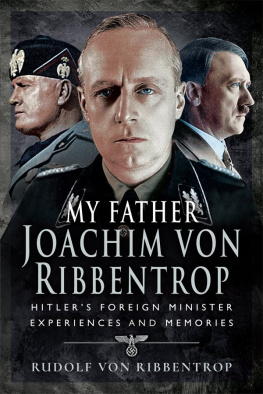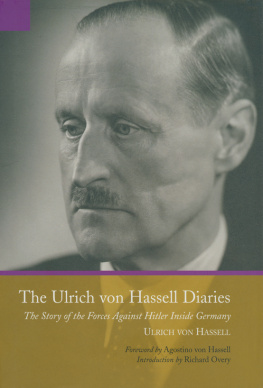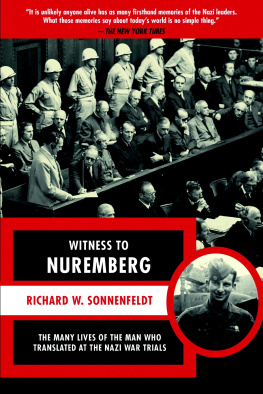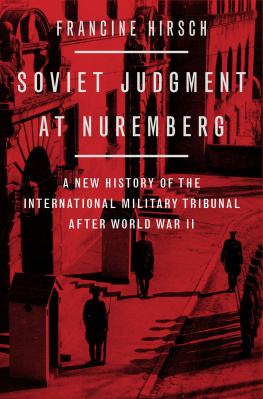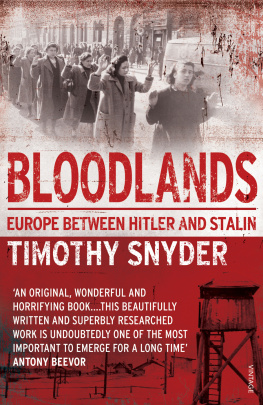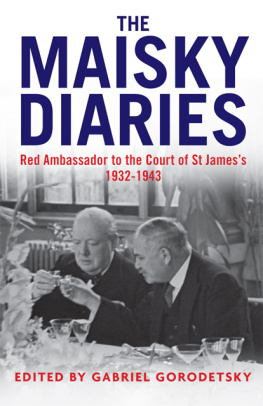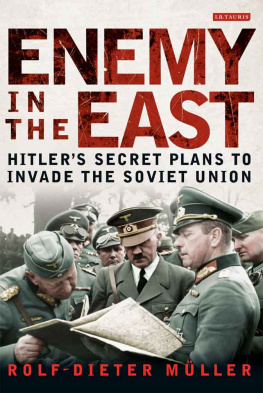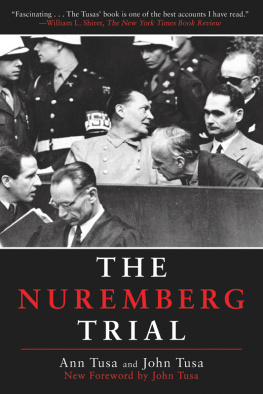
My Father Joachim von Ribbentrop
Bibliography of the Author
Charmley, John: Churchill. Das Ende einer Legende, Berlin 1995.
Ribbentrop, Annelies v.: Verschwrung gegen den Frieden. Studien zur Vorgeschichte des Zweiten Weltkrieges, Leoni am Starnberger See 1962.
, Deutsch-Englische Geheimverbindungen. Britische Dokumente der Jahre 1938 und 1939 im Lichte der Kriegsschuldfrage, Tbingen 1967.
, Die Kriegsschuld des Widerstandes. Aus britischen Geheimdokumenten 1938/39, Leoni am Starnberger See 1974.
Ribbentrop, Joachim v.: Zwischen London und Moskau. Erinnerungen und letzte Aufzeichnungen, Leoni am Starnberger See 1953.
Scheil, Stefan: Logik der Mchte. Europas Problem mit der Globalisierung der Politik, Berlin 1999.
, Fnf plus Zwei. Die europischen Nationalstaaten, die Weltmchte und die vereinte Entfesselung des Zweiten Weltkrieges, Berlin 2003.
, 1940/41: Die Eskalation des Zweiten Weltkriegs, Mnchen 2005.
, Ribbentrop. Oder: Die Verlockung des nationalen Aufbruchs. Eine politische Biographie, Berlin 2013.
Tansill, Charles: Die Hintertr zum Krieg. Das Drama der internationalen Diplomatie von Versailles bis Pearl Harbor, Dsseldorf 1956.
My Father Joachim
von Ribbentrop
Hitlers Foreign Minister, Experiences and Memories
Rudolf von Ribbentrop
Translated by Doolie Sloman

First published in Great Britain in 2019 by
Pen & Sword Military
An imprint of
Pen & Sword Books Ltd
Yorkshire Philadelphia
Copyright Rudolf von Ribbentrop 2019
ISBN 978 1 52673 925 4
eISBN 978 1 52673 926 1
Mobi ISBN 978 1 52673 927 8
The right of Rudolf von Ribbentrop to be identified as Author of this work has been asserted by him in accordance with the Copyright, Designs and Patents Act 1988.
A CIP catalogue record for this book is available from the British Library.
All rights reserved. No part of this book may be reproduced or transmitted in any form or by any means, electronic or mechanical including photocopying, recording or by any information storage and retrieval system, without permission from the Publisher in writing.
Pen & Sword Books Limited incorporates the imprints of Atlas,
Archaeology, Aviation, Discovery, Family History, Fiction, History,
Maritime, Military, Military Classics, Politics, Select, Transport,
True Crime, Air World, Frontline Publishing, Leo Cooper, Remember
When, Seaforth Publishing, The Praetorian Press, Wharncliffe
Local History, Wharncliffe Transport, Wharncliffe True Crime
and White Owl.
For a complete list of Pen & Sword titles please contact
PEN & SWORD BOOKS LIMITED
47 Church Street, Barnsley, South Yorkshire, S70 2AS, England
E-mail:
Website: www.pen-and-sword.co.uk
Or
PEN AND SWORD BOOKS
1950 Lawrence Rd, Havertown, PA 19083, USA
E-mail:
Website: www.penandswordbooks.com
Dedication
I wish to dedicate this book to the memory of my mother, who very early on in my life gave me a glimpse behind the scenes into world history; and to my beloved wife, who with endless patience has accompanied the work on this book; and to my gallant soldiers, alive or dead, whose leader I had the honour to be in the war.
Foreword
Following the Battle of the Bulge (the Ardennes Offensive), in January 1945 I was posted to the Fallingbostel military training area to arrange a refreshing the term used in those days when, after deployment, troops, weapons and equipment had to be replaced of the armoured battalion that I had taken over after its commanding officer had been killed in action. The battalion had suffered severe losses and the division had already been transferred to Hungary again in order to take part in the imminent Lake Balaton offensive. I was in consequence directly under the command of an office which was quartered in alternative accommodation east of Berlin. The replacement troops, weapons and equipment were thence to be allocated to me.
On my way to where this office was located, it chanced that in the evening of 2 February 1945, driving my Volkswagen bucket car (VW-Kbelwagen), I arrived in Berlin at the home of my parents, who would give me makeshift accommodation, as the building belonging to the Foreign Ministry housing the official ministerial residence had largely been destroyed. I was about to leave the next morning when it was announced that substantial bomber formations were approaching the capital. As I was not bound to a specific time, I decided to stay on in Berlin for the opportunity to witness the effect of the notorious terror attacks on the civilian population in the form of strategic firestorm bombing of a populated area that one hardly experienced while in the field with the troops. Little could I foresee what lay in store for me!
The air raids target was the quarter where the government buildings were sited: this was only too obvious because of the noise made by the impact of the strikes so close by. My Volkswagen was parked in front of the Wilhelmstrasse building. How was I to get back to my battalion in Fallingbostel should the car be wrecked? Trains had not been running for some time.
However, when the bombing abated I found that it had miraculously escaped any damage. Only then did I look down the familiar Wilhelmstrasse towards the Reichskanzlei, the Chancellery that stood a few hundred metres further away on Wilhelmplatz. Fires raged everywhere; the road was covered in heaps of rubble. My father, dressed in uniform and cap, crossed the courtyard in front of the building and asked me to accompany him on foot to the Chancellery. Because of the fires and rubble he probably considered it important to give the people gradually emerging from the basements to the daylight an example of calm demeanour.
Just down the road we suddenly saw the Japanese ambassador, General Oshima, in front of us, also in uniform. He greeted me warmly we had known each other for many years. The two gentlemen formally acknowledged that the situation was critical but that there was no doubt one would come through it. It was a weird scene, abruptly interrupted when a woman, evidently distraught, rudely shoved her baby carriage between the two gentlemen and roughly pushed them apart, which they both took with equanimity. With a friendly smile, as the custom in his country requires even in the face of a devastating catastrophe, the general bade us goodbye.
Being in the army, after five years of war the sight of burning or destroyed cities was no longer unfamiliar, but in this case I felt the history of Germany was visibly sinking into annihilation. While still children we had been made aware that the building in front of which I now stood with my father was the residence of the president of the Reich, who in those days was Paul von Hindenburg.
The location on Wilhelmstrasse, where Bismarck had formulated Germanys policy, was a well-known address, like 10 Downing Street in London, the Quai dOrsay in Paris, Viennas Ballhausplatz, Washingtons White House or the Kremlin in Moscow. It was here that national policies had been formed and thereby made history. At the time I had no way of knowing how persistently in the years to come in the consciousness of Germans their history would be extinguished and not only due to the destruction of historic buildings.
As we walked on, out of the blue my father asked me: What do you think of this? Goebbels has proposed to the Fhrer to repudiate the Geneva Convention with the argument that if prisoners and casualties did not have the protection of the Red Cross, combatants in the West would fight harder. I couldnt believe my ears and entreated my father to prevent this madness. Despite hopelessly inferior numbers, the army was fighting bravely on all fronts, and at no time in the front line had it come to disintegration; it would be criminal to deprive soldiers in dire straits of the protection of the Geneva Convention. I could moreover predict with certainty that it would have precisely the opposite effect of what Goebbels expected: troops would perceive it as running amok, a last-ditch act of desperation which indeed it was; furthermore, the enemy would fight with even grimmer determination when not knowing what would befall if he were to be taken prisoner. The negative experiences with the so-called
Next page
